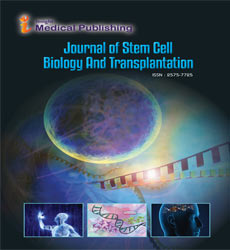ISSN : 2575-7725
Journal of Stem Cell Biology and Transplantation
Stem cell therapy in radiotherapy from bench to Clinical Trial Evaluating the Efficacy of Mesenchymal Stromal Cell Injections for the Treatment of Chronic Pelvic Complications Induced by Radiation Therapy
Abstract
The late adverse effects of pelvic radiotherapy concern 5 to 10% of patients, which could be life threatening. However, a clear medical consensus concerning the clinical management of such healthy tissue sequelae does not exist. Our group has demonstrated in preclinical animal models that systemic mesenchymal stromal stem cells (MSCs) injection is a promising approach for the medical management of gastrointestinal disorder after irradiation. In a phase 1 clinical trial, we have shown that the clinical status of four first patients suffering from severe pelvic side effects (Epinal accident) was improved following MSC injection. Two patients revealed a substantiated clinical response for pain and hemorrhage after MSC therapy. The frequency of painful diarrhea diminished from 6/d to 3/d after the first and 2/d after the 2nd MSC injection in one patient. A beginning fistulization process could be stopped in one patient resulting in a stable remission for more than 3 years of follow-up. A modulation of the lymphocyte subsets towards a regulatory pattern and diminution of activated T cells accompanies the clinical response. MSC therapy was effective on pain, diarrhea, hemorrhage, inflammation, fibrosis and limited fistulization. No toxicity was observed. We are now starting a clinical research protocol for patients with post-radiation abdominal and pelvic complications who have not seen their symptoms improve after conventional treatments (NCT02814864, Trial evaluating the efficacy of systemic MSC injections for the treatment of severe and chronic radiotherapy-induced abdomino-pelvic complications refractory to standard therapy (PRISME). It involves the participation of 6 radiotherapy services for the recruitment of 12 patients. They will all be treated and followed up in the hematology department of Saint Antoine Hospital. The cells will be prepared in two production centers (EFS Mondor and CTSA). Treatment is a suspension of allogeneic MSCs. Eligible patients must have a grade greater than 2 for rectoragy or hematuria at inclusion and absence of active cancer. Each patient receives 3 injections of MSCs at 7-day intervals. Patients will be followed up over a 12-month period. The main objective is a decrease of one grade on the LENT SOMA scale for rectorrhagia or hematuria. The secondary objective is to reduce the frequency of diarrhea; analgesic consumption, pain and improved quality of life.
Open Access Journals
- Aquaculture & Veterinary Science
- Chemistry & Chemical Sciences
- Clinical Sciences
- Engineering
- General Science
- Genetics & Molecular Biology
- Health Care & Nursing
- Immunology & Microbiology
- Materials Science
- Mathematics & Physics
- Medical Sciences
- Neurology & Psychiatry
- Oncology & Cancer Science
- Pharmaceutical Sciences
